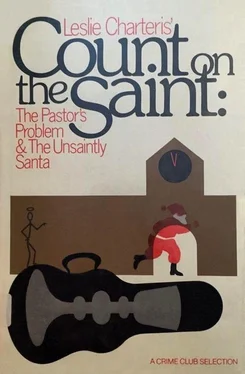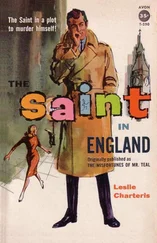The courtyard he entered was paved with flagstones bordered by a gravel drive with a statue of the patron saint rising above an ornamental pond in the centre. The snow had contrived to hide the more hideous features of the façade, and its smooth whiteness gave the college an almost Dickensian Christmas-card prettiness. The court was deserted. A battered Austin saloon parked near the main steps and a solitary lighted window on the third floor were the only signs of life.
The Saint headed diagonally across the quad towards the entrance to the adjoining courtyard, which would lead him to a third, and from there to a side entrance, which he hoped would be unlocked and would deposit him within a few hundred feet of his destination. The only lighting came from a half dozen gas lamps hanging from ornate brackets fixed onto the dividing walls, but it was enough together with the whiteness of the snow and a waxing moon for him to walk briskly. As he passed the pond he heard the carol singers again, much louder this time, and guessed that they too must be using the college grounds as a short cut and keeping in practice as they went, for there could be no chance of a donation for them in the college that night.
Almost at the same instant as he heard the carollers again he saw the shadows move.
It was no more than a brief blocking of the light that filtered through the entrance to the adjoining courtyard, but it made him stop in mid-stride and the chill which crept upwards from the small of his back to the roots of his hair owed nothing to the temperature of the night. For the figure which had so fleetingly crossed his vision was that of a man clad in a flowing robe, his head and face hidden by a pointed cowl.
The Saint did not believe in ghosts, but he had seen too much in his life to disbelieve in them. Now the open mind he had always maintained on the subject was rapidly closing. The thing which had moved with such speed and silence could only have been a monk. Given that it had been the monks of the original St. Enoch’s monastery who had been the recipients of the merchants’ money, it was not a comforting thought.
The shock stilled him for only a moment, and then he was on his toes and racing towards the doorway. His brain registered the fact that the singing had stopped, but he gave it no conscious consideration. He reached the arch and went through without slackening speed. His eyes were automatically scanning the way ahead, searching for the mysterious figure, not looking down.
His foot caught as he cleared the shadow of the entrance and sent him pitching headlong. The loose snow sprayed around him as he hit the ground, momentarily blinding him to the cause of his fall. Instinctively he rolled away from the danger, springing upright and turning to face the man who had tripped him.
But the man made no move. He lay face down in the snow, his black overcoat only a shade darker than the shadows which had hidden him from the Saint’s eyes.
The Saint knelt and carefully rolled him over while his fingers automatically felt for a pulse. But the wide staring eyes that gazed sightlessly up at him told him the search would be futile.
The body was that of a middle-aged, middle-height, middle-weight man wearing a dark business suit. A leather briefcase lay beside him but, like his pockets, appeared untouched. The length of silver twine that had killed him was still embedded deep in the flesh of his throat — flesh which despite the cold of the snow was still warm.
The realisation that the murder could only have happened seconds before made the Saint glance quickly around. But of murderers or monks there was no sign. What there was was a female of Wagnerian stature stamping hurriedly across the snow towards him. Simon held up his hand but she ignored the gesture and kept coming.
“Get the police! Hurry!” he called out, and only on the word “police” did her footsteps falter.
She stopped, stared for a few mute seconds, and then emitted a scream that would have done credit to a Valkyrie. The Saint winced, but his eyes were on the group of children clustered on the other side of the court. A few of the older, braver ones were edging nearer. He pointed towards them.
“Keep the kids away. And, for Pete’s sake, shift yourself and call the police.”
This time his words got through, but by then they were superfluous, for a blue uniform, attracted by the scream, was already lumbering into view.
The Saint looked from the constable to the corpse and back again. A wry smile played with the corners of his lips as he stood up. He never actually spoke the words “Here we go again.” But he thought them.
It was three hours since he had left the Crown. Even if the clock on the interview-room wall had not told him so, his stomach would have done. The nearest the Cambridge constabulary had come to providing refreshment had been a mug of tea the colour of mahogany and the consistency of a rich soup, and a digestive biscuit so stale that a weevil would have been ashamed to be found dead in it. The beat bobby who had answered the woman’s scream had summoned his superiors, and everyone had been kept waiting in the cold until the body had finally been removed and the area diligently combed for clues, of which there had appeared to be a distinct shortage. Then the Saint, the woman, and her choir of carol singers had been brought to the station and had given their statements, waited for them to be typed, and signed the same. At which point he had expected to be allowed to proceed on his lawful business of searching for sustenance.
Experience, however, had warned him that that was likely to be a forlorn hope. As soon as his identity had been established, the duty inspector had contacted his chief, and the Saint had been escorted to the interview room to await the detective’s arrival. Such, at times, was the price of fame.
That detective, in the unenlightening shape of Superintendent Frederick Nutkin, now sat on the opposite side of the table, carefully reading through the Saint’s statement, which he had doubtless already scanned before entering the room. If the process was intended to unsettle him it was a failure. For once the possessor of a clear conscience, Simon Templar was completely at ease, but his irritation was growing. He surveyed the detective with practised appraisal and did not like what he saw.
Superintendent Nutkin had apparently been dining out when the news reached him and had not welcomed being disturbed. Simon guessed that the celebration had been with Mrs. Nutkin. He played with the vision of a candlelit supper with a young well-proportioned blonde, but understood that a man like Superintendent Nutkin would never consider such a liaison in case it jeopardised his ambition to join the Parochial Church Council. He looked like a man whose ambition was to be a parochial church councillor: he was in his late forties, tall, wiry of frame, and sparse of hair, and exuded an aura of pomposity and pride.
Simon waited patiently for him to finish his reading. At last the superintendent laid the statement on the table between them and fixed the Saint with a suspicious stare.
“And this is everything that happened from the time you left the Crown?”
“To the last dotted i, ” the Saint said.
Nutkin scratched his chin as his eyes travelled down the typescript. Simon found the gesture annoying. Finally the detective located the passage he was looking for and read it aloud in the same dry tone he would have used for giving evidence in court.
“I was crossing the main courtyard and had just passed the pond when I saw a figure in the archway leading to the adjoining court. I ran towards the figure.”
Nutkin looked searchingly at the Saint.
“Why? Do you normally go chasing after everyone you see?”
Читать дальше












